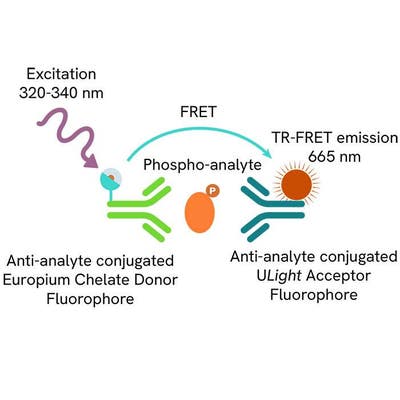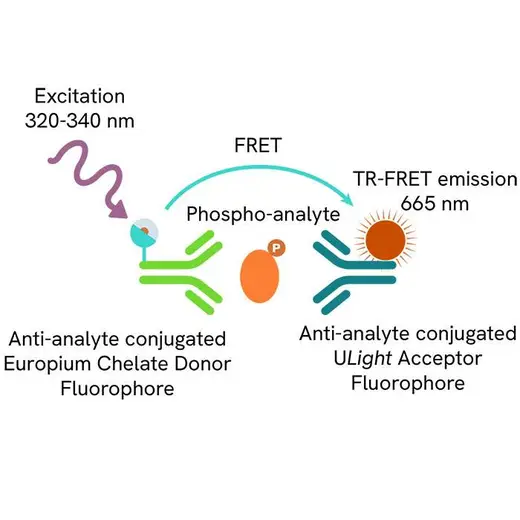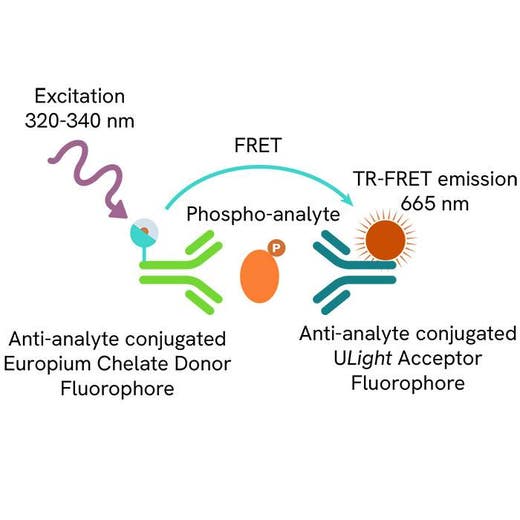
LANCE Ultra Phospho-BTK (Tyr223) Detection Kit, 10,000 Assay Points

LANCE Ultra Phospho-BTK (Tyr223) Detection Kit, 10,000 Assay Points




LANCE Ultra Total BTK kits are designed for the detection of total BTK (phosphorylated and non-phosphorylated) in cell lysates using a simple, homogeneous LANCE Ultra assay (no wash steps). This assay can be used as a normalization assay for phospho-BTK detection, and is compatible with both adherent and suspension cells.
For research use only. Not for use in diagnostic procedures. All products to be used in accordance with applicable laws and regulations including without limitation, consumption and disposal requirements under European REACH regulations (EC 1907/2006).
| Feature | Specification |
|---|---|
| Application | Cell Signaling |
| Sample Volume | 15 µL |
LANCE Ultra Total BTK kits are designed for the detection of total BTK (phosphorylated and non-phosphorylated) in cell lysates using a simple, homogeneous LANCE Ultra assay (no wash steps). This assay can be used as a normalization assay for phospho-BTK detection, and is compatible with both adherent and suspension cells.
For research use only. Not for use in diagnostic procedures. All products to be used in accordance with applicable laws and regulations including without limitation, consumption and disposal requirements under European REACH regulations (EC 1907/2006).


LANCE Ultra Phospho-BTK (Tyr223) Detection Kit, 10,000 Assay Points


LANCE Ultra Phospho-BTK (Tyr223) Detection Kit, 10,000 Assay Points


Product information
Overview
Please note control lysates are sold separately, catalog number TRF4021S.
Formats:
- Our 500 assay point kit allows you to run 500 wells in 384-well format, using a 20 µL reaction volume.
- Our 10,000 assay point kit allows you to run 10,000 wells in 384-well format, using a 20 µL reaction volume.
LANCE® and LANCE® (Lanthanide chelate excite) Ultra are homogeneous (no wash) TR-FRET (time-resolved fluorescence resonance energy transfer) technologies. One antibody of interest is labeled with a donor fluorophore (a LANCE Europium chelate) and the second antibody is labeled with an acceptor fluorophore [ULight™ dye]. Upon excitation at 320 or 340 nm, energy can be transferred from the donor Europium chelate to the acceptor fluorophore if sufficiently close for FRET (~10 nm). This results in the emission of light at 665 nm. Data are represented as ratiometric (665/615 nm X 10,000).
BTK is a cytoplasmic tyrosine kinase present in B-cells. It is associated with the B-cell receptor and receptors of the toll family. Upon activation, BTK will activate the Nf-kB pathway. This will induce maturation of B-cells into antibody producing cells and also increase the secretion of activating cytokines (such as IL-2). The protein is absent or non-functional in diseases such as aglobularia, but is also involved by hyperactivation in inflammation and auto-immune diseases. Also, several leukemia-like cancers have dysregulation of BTK.
Specifications
| Application |
Cell Signaling
|
|---|---|
| Automation Compatible |
Yes
|
| Brand |
LANCE Ultra
|
| Detection Modality |
LANCE
|
| Molecular Modification |
Total
|
| Product Group |
Kit
|
| Sample Volume |
15 µL
|
| Shipping Conditions |
Shipped in Blue Ice
|
| Target |
BTK
|
| Target Class |
Phosphoproteins
|
| Technology |
TR-FRET
|
| Therapeutic Area |
Autoimmunity
Immuno-oncology
Neuroscience
Oncology
|
| Unit Size |
10,000 Assay Points
|
Resources
Are you looking for resources, click on the resource type to explore further.
Emerging pathways to neuroinflammation and neurodegeneration
Neurodegenerative diseases, such as amyotrophic lateral sclerosis...


How can we help you?
We are here to answer your questions.






























